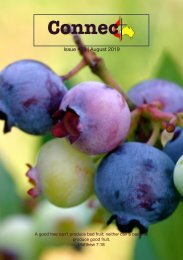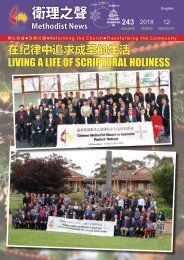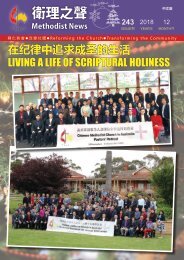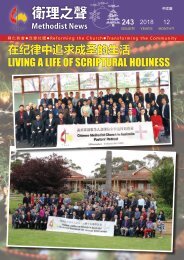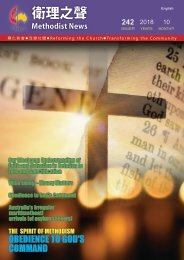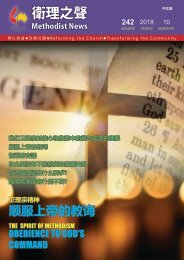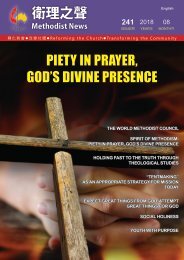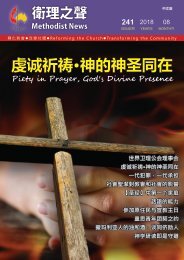2016ustrip
21st World Methodist Conference & CMCA Pastor Retreat at Asbury Theological Seminary
21st World Methodist Conference & CMCA Pastor Retreat at Asbury Theological Seminary
You also want an ePaper? Increase the reach of your titles
YUMPU automatically turns print PDFs into web optimized ePapers that Google loves.
Session V - Part I: The Bible In Mission (Holy Word, Holy Writ)<br />
by Dr Ben Witherington III<br />
1) The development of the concept of “Word of God” in early days<br />
At the opening of the topic, Dr Witherington said a discussion of the “Word of<br />
God” too often limits itself to either the text or the person. This overlooks the<br />
fact that before the text and before the Incarnation, there was already the Word<br />
of God spoken, and the oral word continued to be called Word of God. In oral<br />
culture, the spoken word was supreme and seen as a living thing, especially in<br />
its prophetic form.<br />
It was a fundamental belief of monotheistic Jews and Christians in Biblical<br />
times that an Almighty God could indeed speak the divine word accurately and adequately through human<br />
vessels – whether they were prophets, priests, or kings, or ordinary people. To deny the reality of this<br />
phenomenon was to deny that true prophecy was possible.<br />
Dr Witherington quoted Ps 119 that it is not surprising to find in Hebrew Scriptures that what Torah says,<br />
God says. He continues by using 2 Tim 3:16, 1 Thess 2:13 and Acts 6:7 and 12:24, and concluded that the<br />
Word of God as a concept was applied to oral communication and written communication from God, before<br />
it was applied to a person – Jesus.<br />
2) The development of the concept of “Word of God” during the NT period<br />
There were two developments in the NT period: firstly, the treatment of Christian documents as also Holy<br />
Writ, with Paul’s letters (2 Pet 3:16) as an example. Secondly, Dr Witherington said that in some ways, the<br />
most intriguing step in this process was the identification of God’s Word with the pre-incarnate Son of God,<br />
who took the flesh – John 1 “The Word became flesh”. In the NT, the Word of God is “Jesus”, and the bible<br />
is called the “writing”, where the Word of God was proclaimed by the OT prophets.<br />
A clear and multifaceted Word of God theology already existed in biblical time; it was not imposed later<br />
onto a series of texts. This theology involved oral proclamation, text, and a person – Jesus.<br />
3) The Hermeneutical Today<br />
Dr Witherington brought up the issue of how much of the OT applies to Christians, since we are under the<br />
new covenant and not the old ones. From here, he taught of two hermeneutical moves: firstly, all that is not<br />
specifically abrogated in the NT still applies; secondly, only that which is reaffirmed in the NT are Christians<br />
obligated to keep or follow. Dr Witherington stressed that an understanding of covenantal theology and<br />
church historical usage lead to the conclusion that the second hermeneutical move is deemed to be the correct<br />
one. He further elaborated that this conclusion arose because texts like the Sermon on the Mount or Paul’s<br />
letter to the Galatians assumed that the followers of Jesus were in an eschatological situation and no longer<br />
bound to the Mosaic Law.<br />
Dr Witherington in his conclusion said that it needs to be stressed that claims about the Word of God, in<br />
antiquity as today, applied directly to the original text in its original language – not to some specific<br />
translation in whatever language, because every translation is already an interpretation, unavoidably so.<br />
This is why an original language study of God’s Word is essential to good<br />
preaching.<br />
The final challenge Dr Witherington posted:<br />
Our mission is to get the Word for people to believe.<br />
We need to share the Word incarnate.<br />
Our mission is to get the Book into one’s soul.<br />
We need to lead a person to Christ in person.<br />
Rev Kong Eing Tiong<br />
24






